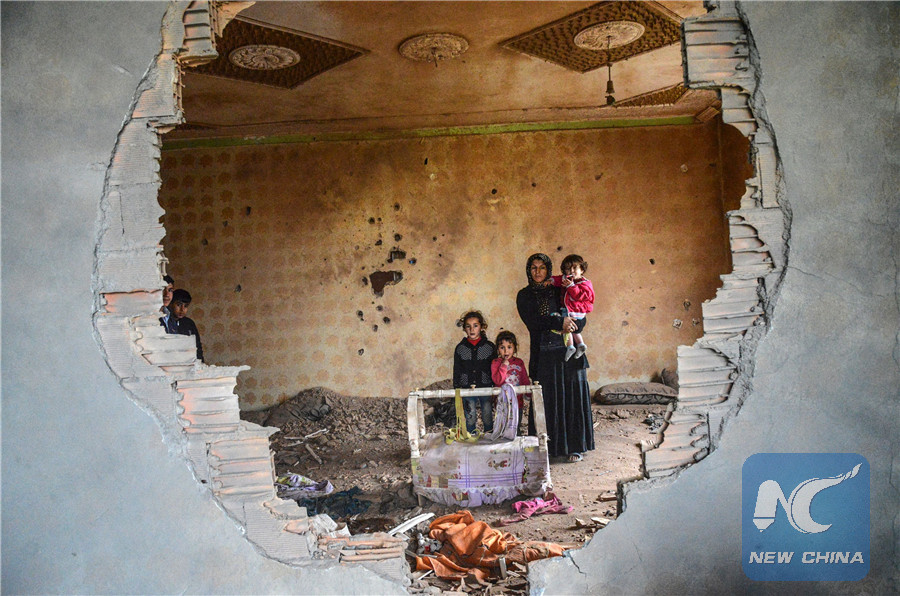A women and her children stand in the ruins of battle-damaged house in the Kurdish town of Silopi, in southeastern Turkey, near the border with Iraq on January 19, 2016. (AFP/Xinhua)
ANKARA, Jan. 9 (Xinhua) -- Normalization of Turkish-Iraqi ties comes after a change of perspective of Ankara in a bid to restore its bilateral relations in the region, local experts said.
The dynamic of the normalization was interrupted when Turkey sent troops to Bashiqa military camp in northern Iraq and deployed additional troops along Turkish-Iraqi border, Bilgay Duman, Middle East expert at Center For Middle Eastern Strategic Studies (ORSAM), told Xinhua.
At the weekend, the visiting Turkish Prime Minister Binali Yildirim and his Iraqi counterpart Haider al-Abadi co-chaired the third meeting of the High-Level Strategic Cooperation Council in Baghdad with the participation of a number of ministers from both sides, including the energy, economy, trade, foreign, defense and transport ministers.
The visit is seen as a new beginning in ties between the two neighbors following months of crisis over Turkey's military camp in Bashiqa region of Mosul, which purportedly aimed to train local Sunni groups in the fight against the Islamic State (IS).
A recent ceasefire deal in Syria that Russia and Turkey, along with Iran, brokered also eased normalization between Ankara and Baghdad, the expert said, recalling one of the differences of two countries were on Syria.
Turkey and Iraq were on different sides, as the Iraqi administration, acting with Iran and Russia, has lend support to Syrian President Bashar al-Assad, while Turkey insisted al-Assad to step down and supported Syrian rebels since the crisis erupted in 2011, he said.
The issue of the Kurdistan Workers' Party (PKK) has become a serious issue for Iraq as well, threatening sovereignty of the country since the group advanced from Qandil Mountain and Sinjar region to the outskirts of Kirkuk, Duman said.
As the PKK began to harm Iraq's sovereignty, Ankara and Baghdad have another reason to cooperate, he added.
Duman said Turkey has intensified its efforts in struggle against the IS group, a joint threat for both countries.
Through exchange of delegations recently, Turkey has been better expressing itself in dialogue between the two capitals, Duman said, referring to suspicion on the Iraqi administration if Ankara was pursuing a "expansionist policy."
"Turkey clearly told Iraq that it has no eye on any country's land," he noted.
Elaborating on the outcomes of the visit, he said the two countries will push to increase trade and make joint efforts in fight against terror, including the PKK and the IS. The two countries also plan to sign a new agreement on energy after the Mosul operation ended.
Whenever the IS group is defeated in Iraq, Baghdad will need Ankara for rehabilitation and keeping social and political balance in places where the group will leave, according to Duman.
Despite good will for restoring ties, both countries still have differences on the issue of Turkish troops in Bashiqa military camp in northern Iraq.
Baghdad wants to be sure for withdraw of Turkish troops, while Ankara says they are not permanent in Iraq and will retreat after the Mosul offensive ended.
Turkey has long been suffering from internal and external terrorism since June 2015, therefore, its will to cooperate with regional countries has vital importance, said Serkan Demirtas, local Hurriyet Daily News columnist.
The foreign policy pundit believes this visit is not a magic touch that will resolve all differences between Ankara and Baghdad, particularly on the issue of the Bashiqa camp, but they will be able to engage in a dialogue so that they can better find ways to cooperate, the expert said.
Demirtas underlined that energy is the most vital area of cooperation between Iraq and Turkey since the latter could be the route for Iraqi natural resources to world markets.
Iraq was Turkey's second most important market with an annual trade volume of 9 billion U.S. dollars, but the strain in bilateral relations has inflicted a heavy blow on commerce.


